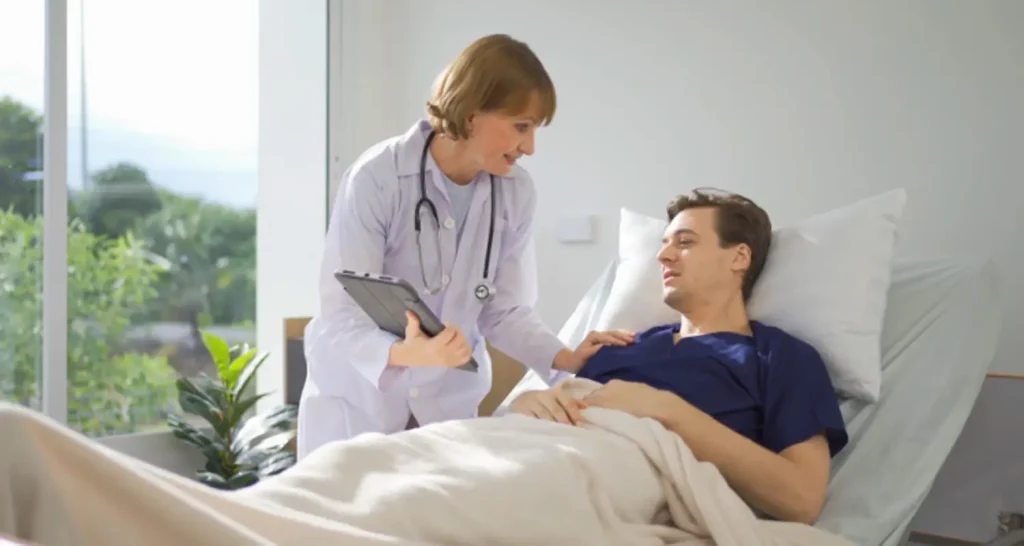
Integrating Medications Into Recovery
The opioid epidemic has left many individuals in need of effective, compassionate care. As treatment continues to evolve, research consistently shows that medication-assisted treatment (MAT) has among the highest success rates of any recovery method. While once stigmatized, MAT is now recognized as a clinically proven, life-saving approach to addiction treatment.
At Legacy Healing Center, our MAT program integrates medical care, evidence-based therapies, and holistic support to help patients navigate early recovery with greater comfort and stability. We customize each plan based on the individual’s history, needs, and clinical assessment, offering medication-assisted treatment (MAT) as one option among many to support long-term healing.
How Does MAT Work?
MAT supports recovery by relieving withdrawal symptoms, reducing cravings, and making the medical detox and early recovery phases more manageable. Under the care of licensed professionals, patients may be prescribed FDA-approved medications that are significantly safer than the substances they’ve been using.
These medications enable the body and brain to stabilize, allowing individuals to fully engage in the therapeutic aspects of recovery. MAT is most commonly used to treat opioid and alcohol addiction. While there are no FDA-approved medications for stimulant addiction, our team offers other evidence-based strategies for those cases.
What to Expect During Treatment
Medication-assisted treatment at Legacy Healing Center begins with a thorough clinical evaluation to determine whether this approach is appropriate for your recovery plan. If recommended, your medical team will oversee a personalized treatment protocol that may include medications during detox, residential treatment, and outpatient care.
It’s important to note that MAT is always paired with therapy; it is never used as a standalone solution. Counseling, peer support, and holistic care remain at the heart of our recovery philosophy.
How MAT Helps Patients Who Struggle with Substance Abuse
Choosing sobriety is courageous, but the early stages of recovery can feel overwhelming. MAT reduces the physical and psychological distress that often accompanies withdrawal, helping individuals stay focused on healing instead of struggling with cravings.
When the body and mind are more stable, patients are more receptive to therapy, more likely to engage in long-term care, and better equipped to address the underlying causes of their addiction.
Addressing the Stigma Surrounding Medications for Recovery
Despite its proven success, MAT has been misunderstood by some as simply “replacing one drug with another.” At Legacy Healing Center, we strongly reject that notion.
The medications used in our program are FDA-approved, non-habit-forming, and carefully administered under medical supervision. MAT is not a shortcut; it’s a tool. Combined with comprehensive therapy, it enhances the effectiveness of treatment and empowers individuals to reclaim their lives with clarity and strength.
FDA-Approved Medications for Alcohol and Opioid Addiction
Medication-assisted treatment (MAT) is most commonly used to support recovery from alcohol and opioid addiction. At Legacy Healing Center, we tailor each treatment plan to the individual, selecting medications thoughtfully, based on clinical need, comfort, and safety.
Medications for Alcohol Use Disorder:
- Vivitrol (naltrexone): Administered monthly by injection, Vivitrol helps reduce the risk of relapse by blocking the euphoric effects of alcohol. It supports accountability and long-term commitment to sobriety.
- Campral (acamprosate): Often used after detox, Campral helps ease common withdrawal symptoms such as anxiety, insomnia, and restlessness. It also assists in restoring balance to the brain’s neurochemistry, helping to reduce alcohol cravings over time.
Medications for Opioid Use Disorder:
- Buprenorphine: A partial opioid agonist, buprenorphine reduces cravings and withdrawal symptoms without producing the same high as other opioids. It is available in various formulations, including Suboxone (combined with naloxone) for added safety.
- Methadone: A long-acting opioid agonist used in specific clinical settings to stabilize individuals with severe opioid use disorder. It is administered under strict medical supervision.
- Naltrexone: As with alcohol treatment, naltrexone can also be used to block the euphoric effects of opioids and support relapse prevention.
Note: At present, there are no FDA-approved medications specifically for stimulant addiction (such as cocaine or methamphetamine). However, Legacy Healing Center provides evidence-based therapeutic strategies and holistic support to guide recovery in these cases.
Start Your Recovery with Confidence
If you or someone you love is struggling with addiction, you don’t have to face it alone. Medication-Assisted Treatment (MAT) offers a safe, clinically proven path to ease withdrawal, reduce cravings, and support lasting healing. Our compassionate team is available 24/7 at (888) 534-2295 to help you explore whether MAT is right for you and guide you toward care that’s tailored to your needs.
Not sure where to begin? You can verify your insurance confidentially online or speak directly with one of our treatment specialists. We’ll help you understand your options, answer your questions, and offer thoughtful guidance every step of the way.
Reaching out is a powerful act of hope. When you’re ready, we’re here with expert care, unwavering support, and a treatment plan designed to help you reclaim your life with strength and dignity.
Immediate Help and Support
Whether you’re ready to begin or simply exploring what’s possible, these trusted resources are available to support you:
Legacy Healing Center: Call (888) 534-2295 to speak confidentially with a MAT specialist.
SAMHSA National Helpline: 1-800-662-HELP (4357) – Free, 24/7 support for individuals and families navigating substance use disorders.
988 Suicide & Crisis Lifeline: Dial 988 for immediate assistance in a mental health or substance-related crisis.
You’re not alone—evidence-based support is just one call away.


 Written By:
Written By: Edited By:
Edited By: Clinically Reviewed By:
Clinically Reviewed By: 


 Verify Insurance
Verify Insurance